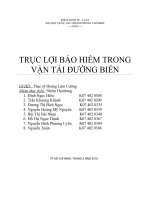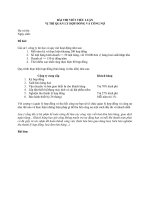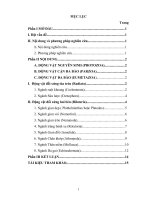TIỂU LUẬN international trade
Bạn đang xem bản rút gọn của tài liệu. Xem và tải ngay bản đầy đủ của tài liệu tại đây (2.06 MB, 36 trang )
Topic 5:
Internationa
l Trade
Member:
1. Ngô Thị Khánh Hiền
2. Nguyễn Thị Thùy Hương
3. Nguyễn Thị Hải Yến
4. Nguyễn Minh Hoàng
2
International
Trade
01
What is
International
Trade?
04
Protectionism
02
03
Advantages and
disadvantages of
International Trade
Comparative and Absolute
Advantage
05
Free Trade
I. What is International
Trade?
What is International Trade?
■ International trade is the exchange of
capital, goods, and services across
international borders or territories
because there is a need or want of
goods or services.
5
II. Advantages and
disadvantages of
international trade?
1. Advantages of
international trade
i. Optimal use of natural resources
International trade helps each country to make
optimum use of its natural resources. Each country can
concentrate on production of those goods for which its
resources are best suited. Wastage of resources is
avoided.
ii. Availability of all types of
goods
It enables a country to obtain goods which it cannot
produce or which it is not producing due to higher
costs, by importing from other countries at lower
costs
9
iii. Specialisation
Foreign trade leads to specialisation and encourages
production of different goods in different countries.
Goods can be produced at a comparatively low cost
due to advantages of division of labour.
10
iv. Advantages of
large-scale production
Nations of the world can dispose of goods which they have in
surplus in the international markets. This leads to production at
large scale and the advantages of large scale production can be
obtained by all the countries of the world.
11
-
12
Lấy hình lúa ở slide 9 để sang slide 8
- Slide 11 gộp vs slide 10
Slide 12 13 gộp chung
- định dạng các advantage như slide
16
v. Stability in prices
International trade irons out wild fluctuations in
prices. It equalizes the prices of goods throughout
the world ignoring cost of transportation, etc
13
vi. Increase in
efficiency
Due to international competition, the producers in
a country attempt to produce better quality goods
and at the minimum possible cost. This increases
the efficiency and benefits to the consumers all
over the world.
15
2. Disadvantages of
international trade
i.
Impediment in the Development
of Home Industries
ii.
Economic Dependence
iii.
Political Dependence
iv.
Danger to International
Peace
i. Impediment in the Development of
Home Industries
International trade has an adverse effect on the
development of home industries. It poses a threat to
the survival of infant industries at home. Due to
foreign competition and unrestricted imports, the
upcoming industries in the country may collapse.
17
ii. Economic Dependence
The underdeveloped countries have to depend upon
the developed ones for their economic development.
Such reliance often leads to economic exploitation. For
instance, most of the underdeveloped countries in
Africa and Asia have been exploited by European
countries.
18
iii. Political Dependence
International trade often encourages subjugation
and slavery. It impairs economic independence
which endangers political dependence.
19
iv. Danger to International Peace
International trade breeds rivalries amongst
nations due to competition in the foreign
markets. This may eventually lead to wars and
disturb world peace.
20
III. comparative and
absolute advantage
( Unfinished)
21
ABSOLUTE ADVANTAGE
Absolute advantage refers to the amount produced per input: a
country has an absolute advantage able to produce a larger
quantity of products than other countries with the same amount
of inputs
22
Good A
Good B
CN1
5
10
CN2
10
4
COMPARATIVE ADVANTAGE
Comparative advantage refers to opportunity costs: a country has a
comparative advantage in something if what they have to give up to
produce that product is less than what their trading partners must give up
Good A
Good B
CN1
5
10
CN2
10
4
Absolute advantage is important, but comparative
advantage is what determines what a country will
specialize in.
23
IV. PROTECTIONISM
24
1) What is the protectionism?
Protectionism involves any attempt by a country to
impose restrictions on trade in goods and services
25









